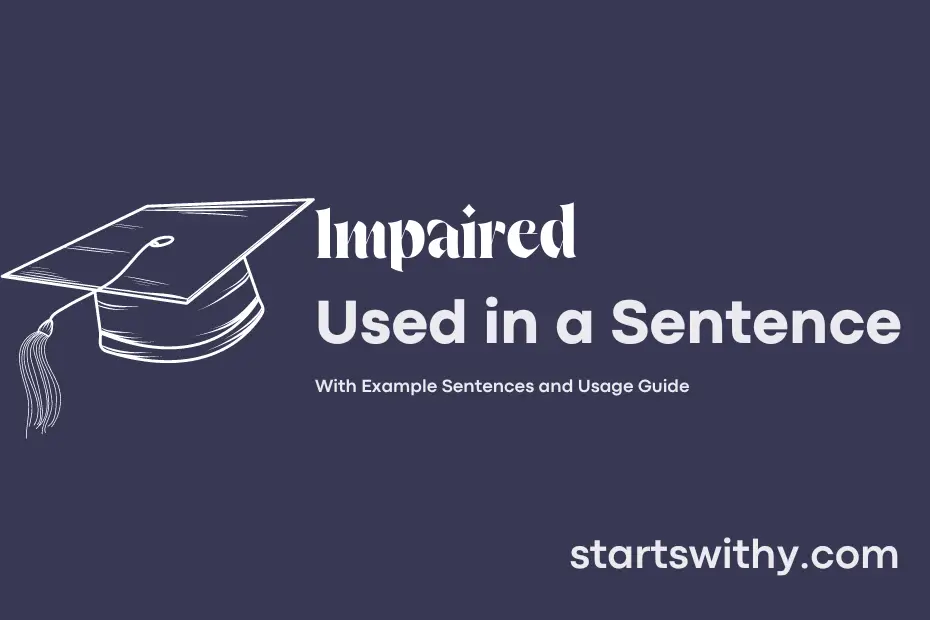Have you ever come across the term “impaired” in legal or medical contexts and wondered what it really means? To put it simply, impaired refers to a condition where one’s ability to function properly is diminished or weakened, often in a physical, mental, or legal capacity.
In legal matters, impairment can refer to a person’s diminished mental or physical abilities, which may impact their decision-making skills or overall functioning. Similarly, in medical terms, impaired can describe a condition where an individual experiences limitations in their physical or cognitive abilities due to injury, illness, or other factors.
7 Examples Of Impaired Used In a Sentence For Kids
- I wore glasses because my impaired vision makes it hard to see far away.
- The impaired butterfly had a broken wing and couldn’t fly properly.
- The old radio had an impaired speaker that made crackling sounds.
- The teacher used a microphone to help the impaired students hear better.
- The impaired squirrel couldn’t climb trees as well as the others.
- The impaired kitten had trouble finding its way around the room.
- The doctor helped the impaired patient by giving them special glasses.
14 Sentences with Impaired Examples
- impaired vision can make it difficult for college students to read small text on presentations.
- In group projects, communication may be impaired if team members are not responsive.
- impaired motor skills can affect a student’s ability to participate in sports activities.
- Without access to reliable internet, online classes may become impaired for college students.
- In noisy environments, concentration levels can become impaired for studying.
- Lack of sleep can lead to impaired cognitive function during exams.
- Excessive use of technology can result in impaired social skills for some college students.
- If financial resources are limited, opportunities for extracurricular activities may be impaired.
- impaired memory can make it challenging for students to retain information for exams.
- Poor diet choices can lead to impaired energy levels during long study sessions.
- Mental health issues can cause impaired academic performance for college students.
- Textbooks that are outdated or incomplete can result in impaired learning outcomes.
- Equipment malfunction during presentations can lead to impaired delivery of information.
- Inadequate lighting in study areas can cause impaired reading ability.
How To Use Impaired in Sentences?
To use Impaired in a sentence, you can follow these simple steps:
-
Identify the context: Consider the situation or scenario where someone’s abilities or functions are limited, reduced, or weakened.
-
Choose the subject: Decide on the person or thing that is experiencing the impairment. This could be an individual, an object, or a system.
-
Formulate the sentence: Construct a sentence using the word Impaired to describe the reduced ability or functionality of the chosen subject.
Example sentence: “His impaired vision made it difficult for him to read the small print.”
-
Check for clarity: Ensure that the sentence clearly conveys the concept of impairment or limitation. Make sure it is easy to understand for others.
-
Practice using the word: Try using Impaired in different sentences to become more comfortable with its usage. You can talk about impaired senses, impaired mobility, impaired judgment, or any other aspect that is affected.
-
Get feedback: Ask someone to review your sentences to see if you have effectively incorporated the word Impaired. This will help you improve your usage over time.
Remember, using Impaired in a sentence is a great way to highlight limitations or restrictions, so make sure to use it thoughtfully and accurately in your writing or conversations.
Conclusion
In conclusion, the examples of sentences with the keyword “impaired” highlight how individuals’ abilities or functions can be hindered or damaged. Whether it is impaired vision, impaired judgment, impaired memory, or impaired motor skills, these examples demonstrate the diverse ways in which impairments can affect someone’s daily life and well-being. It is crucial to recognize and address impairments promptly to provide appropriate support and accommodation for those experiencing such challenges.
By understanding the impact of impairments on individuals, society can promote inclusion, accessibility, and equal opportunities for all. Empathy, patience, and a willingness to adapt environments and interactions are essential in fostering a more inclusive and supportive community for people with impairments. Ultimately, it is important to strive for a society that values and accommodates the diverse needs and experiences of individuals with impairments, ensuring that they can lead fulfilling and dignified lives.



